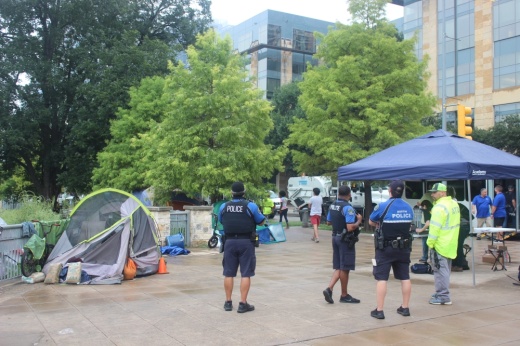The relocation of people experiencing homelessness along West Cesar Chavez Street Aug. 5 represents the latest step in Austin's Housing-Focused Encampment Assistance Link, or HEAL, program. Two encampments designated as high priority by city officials were cleared through the initiative earlier this summer, the first next to East Austin's Terrazas Branch Library and the second in South Central Austin at Ben White Boulevard and Menchaca Road. Around 70 people from those sites have been moved into the Southbridge temporary shelter facility, a former Rodeway Inn hotel at 2711 I-35 S., Austin, the city said.
Downtown, the city said its clearing of the Cesar Chavez encampment between First Street and Congress Avenue could put a roof over the heads of as many as 60 people this week at the newly-opened Northbridge shelter. That converted hotel at 7400 I-35 N., Austin, was purchased by the city last year and most recently served as a COVID-19 Protection Lodge before its turnover as a temporary bridge shelter this summer. The clearing of tents along Cesar Chavez and related offers for relocation to Northbridge will continue Aug. 6, with a clean-up of the former encampment space to take place over the following days.
“By opening Northbridge and working to compassionately close this downtown encampment, we are helping many individuals take their first important step on the journey back to stability and permanent housing,” Homeless Strategy Officer Dianna Grey said in a statement.
The HEAL program's ongoing first stage is set to include four total encampment clearings, with the remaining target site at an unidentified Northwest Austin location to be cleared in the future.
The Aug. 5 clearing operation along Cesar Chavez took place alongside a City Council conversation on homeless strategy across the street at City Hall during a city budget workshop. During that session, some council members expressed a desire to see HEAL expand to cover more encampments through its second stage given the program's results so far, which Grey estimated would cost around $30,000 per person sheltered annually.
Council also further discussed Austin's approach to having shelter or temporary housing available to people experiencing homelessness as more rigid Proposition B camping ban enforcement is set to continue through the summer. Beginning Aug. 8, the fourth and final phase of the ban's implementation will see Austin police continue citing anyone camping in public and, if they do not relocate, potentially arresting them.
Officials through this spring and summer have explored setting up designated encampments on city-owned land as a temporary stopgap for homeless residents while local shelter capacity and permanent housing infrastructure is built up. That concept has encountered mixed reactions from council members so far, with some supporting a further push to find suitable locations for campgrounds and others calling for a halt to the planning process completely.





